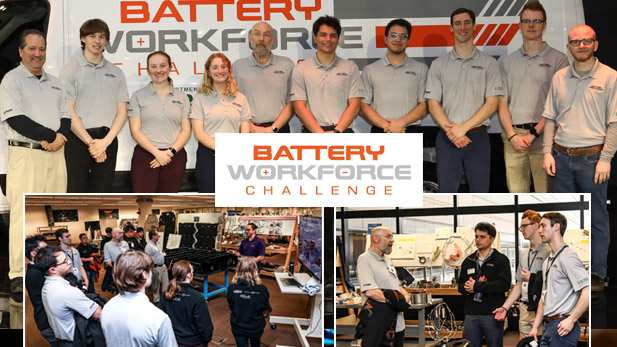Battery Workforce Challenge Team Preparing for Spring Systems Review

Rose-Hulman and Ivy Tech students and faculty received valuable feedback this winter about their plans to develop an advanced battery pack system for Stellantis’ Ram ProMaster electric van as part of the Battery Workforce Challenge.
An educational partnership that has Rose-Hulman students working together with students from Terre Haute’s Ivy Tech Community College to develop innovative battery technology for electric vehicles will take another important step forward this spring after six months of designing and planning for the national Battery Workforce Challenge.
The three-year immersive hands-on learning experience is being sponsored by the U.S. Department of Energy (DOE), Stellantis, and other government and industry partners, and managed by the DOE’s Argonne National Laboratory. The competition has 12 select North American colleges and universities combining with vocational training and youth education in science, technology, engineering, and math (STEM).
The 47-member Rose-Hulman/Ivy Tech team is currently focused on preparations for its first big challenge, a spring status update that will feature a final technical design review of the students’ advanced electric vehicle battery pack system. Upon approval, the battery pack will then be built on campus, starting this fall, and later tested before being implemented into a Stellantis vehicle.
Rose-Hulman project team leader Jack Martin states, “The Battery Workforce Challenge is currently in the process of transitioning from virtual prototypes of the entire battery pack to building a scaled-down module prototype for physical demonstration. Simultaneously, we are conducting various tests on the cells to characterize how they behave in various conditions, a precursor to implementing novel solutions for predicting battery charge, health, and other elements that are essential to creating a consumer-grade electric vehicle.”
At a recent Battery Workforce Challenge’s Winter Workshop near Detroit, team members and faculty advisors were introduced to the 2024 Ram ProMaster electric van that their battery pack will be integrated during the third year of the competition. The vehicle is designed specifically for electrification, featuring a unibody design that efficiently incorporates the production battery pack. Perfect as a work van to perform commercial activities, with a targeted range of 162 miles under in-city driving conditions, the application serves as an exciting opportunity for students to design batteries for bigger vehicles.
Also, team members were given scored technical presentations on their mid-year team status reports and initial architecture designs by professionals from Stellantis, Argonne National Laboratory, DOE, and other competition sponsors.
Rose-Hulman’s team has a variety of participating students, with academic majors covering mechanical engineering, electrical engineering, computer science, engineering design, software engineering, computer engineering, chemistry, chemical engineering, and physics. Five students from Ivy Tech Community College joined the team in January and will contribute to the physical development and fabrication of the battery pack.
“Overall, our team members have reaped the benefits of being involved in this program by gaining valuable industry experience, classroom credit through senior design and independent study courses, receiving internship offers from the sponsor companies, and suiting up to be the next leaders in an emerging sector,” stated Martin, a mechanical engineering major.
Micky Bly, Stellantis’ senior vice president and head of global propulsion systems, states, “This competition is getting these students out of the classroom environment of reading, learning, and testing to be in a hands-on experience to develop the next electric vehicles for the country.”
Other key team members attending the winter workshop were mechanical engineering students Darrian Herniter, Antonio Ventresca, and Peter Espelien; chemical engineering major Makenna Gill; computer engineering and physics student Kallen Selby; computer engineering major Alex Herzog; and Ivy Tech College student Brian Barrett. Faculty advisors participating were electrical and computer engineering professor Marc Herniter, PhD, and Larry Pritchett, chair of Ivy Tech College-Terre Haute’s Department of Engineering, Electronic, and Computer Technology.
A key part of the competition is increasing awareness about battery technology and electrical vehicles within the community. Rose-Hulman team members will be hosting youth outreach events this spring that will have members of Big Brothers Big Sisters of Terre Haute and a local Girl Scouts troop completing age-appropriate battery-related science experiments. Team Co-Advisor and mechanical engineering professor Zac Chambers, PhD, also is planning to distribute information about the Rose-Hulman/Ivy Tech project during a stakeholders luncheon celebrating the 10th anniversary of Indiana’s Battery Innovation Center near the Naval Surface Warfare Center in Crane, Indiana.
The competition culminates in 2026, with the winning teams receiving dozens of annual engineering and sponsor-related category awards, $100,000 in industry-provided prize money, and invaluable real-world experience working with industry leaders.
Additional organizations sponsoring the Battery Workforce Challenge include AVL, Dana Corporation, MathWorks, Analog Devices, Inc., and Gamma Technologies.
Learn more about the Rose-Hulman team and the project here.